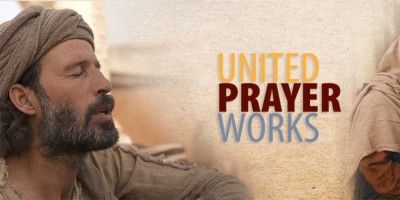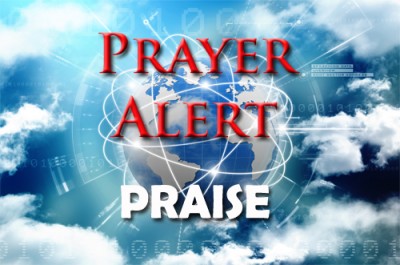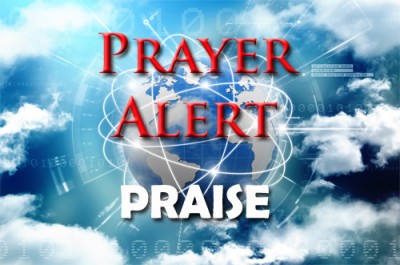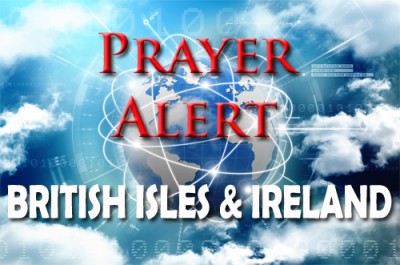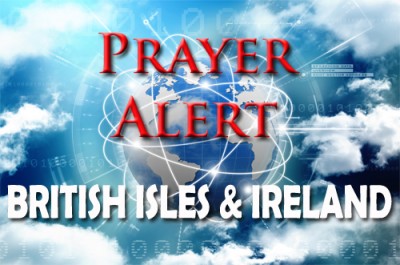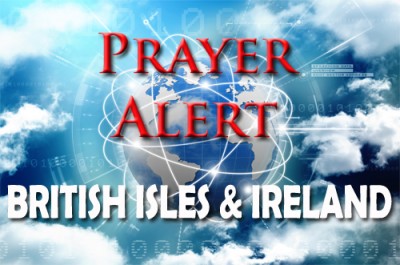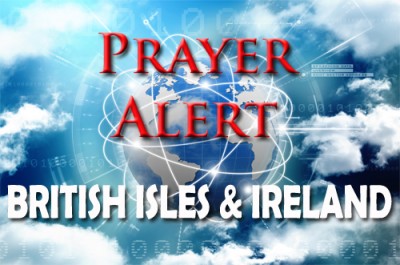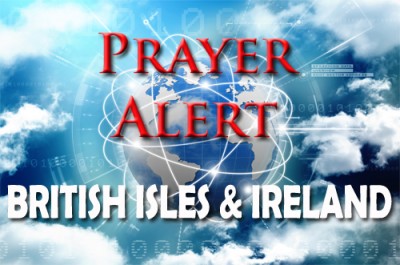“No one can enter a strong man’s house and carry off his possessions unless her first ties up the strong man. Then he can rob his house.” (Mark 3:27)
“All over the world the Church is called to cast out demons, not only out of individuals but also nations. God wants the Church to rule, to bind principalities and powers with authority, and to determine the politics of nations.” - Ingolf Schmidt, German pastor
Recently a group of prayer leaders met in the USA to consider the presence of spiritual strongholds in our nation and how they are affecting our political and social context. Some helpful research underlined to us that we must not be “ignorant of the enemy’s devices” as the apostle Paul exhorts us. We came to the conclusion that it is crucial to further unite intercessors and prayer networks to stand together for the deliverance of the nation. On one level, bringing deliverance to our nation seems like a daunting project. However, it is encouraging to reflect on the fact that just as Jesus sailed across the Galilee with His disciples to bring deliverance to the Gadarene demoniac and his territory, so He is still in the boat with us to help us bring the same liberation to our nations of today!
Over the last 25 years or so, ministry colleagues and I have discovered that God actually does use united prayer initiatives to “determine the politics of nations”. To His glory and by His grace alone, we have witnessed stunning political change in many of the 61 national initiatives that we have had the privilege of facilitating. These initiatives have connected Christian leaders from across the denominational spectrum, and the Lord has used them to bring about truly amazing political and social transformations as well as spiritual revival among the participating ministry leaders.
In this process, we have observed recurring patterns and principles by which the Lord intervenes to change history, often in the midst of humanly hopeless situations. This normally involves the practice of Matthew 18:18-20 unity and Luke 10:18-21 authority, exercised by spiritual leaders and intercessors who have first practiced unhurried confession and repentance for personal and corporate sins (a la Daniel 9 and Nehemiah 1). They have also gotten fully reconciled with one another for past misunderstandings and hurts, both between individuals and institutions.
We have found that this approach is a recipe for real breakthroughs in the macro as well as micro levels of a society. It is as if God is just waiting for us to get our relationships right and then He moves in on this new John 17 oneness to change the headlines by doing those atmospheric things we could never do ourselves. When relationships have been put right through confession, repentance and reconciliation, the local participants have often then felt led to assert Christ’s authority over the spiritual powers that have hindered the progress of the Gospel and brought moral and spiritual bondage to their nation. In this way, over and over again, we have seen the spiritual leaders actually set the agenda for the politicians who carry out what has already been transacted with God through united, authoritative intercession.
In such a prayer encounter with the Lord, Joshua got the strategy for the occupation of Jericho and the rest of Canaan. God’s promise was “every place you put the sole of your foot will be your territory”. In the same way, we need to get our strategies for united, authoritative prayer and the Spirit-led actions that flow out of such praying through a similar encounter with God. Even a small minority can affect the history of their nation in this way as theologian Walter Wink put it so well:
“History belongs to the intercessors, who believe the future into being…Even a small number of people firmly committed to the new inevitability on which they have fixed their imaginations can decisively affect the shape the future takes. These shapers of the future are the intercessors, who call out of the future the longed-for new present. In the New Testament, the name and texture and aura of that future is God's domination-free order, the reign of God.”
How do we identify spiritual powers at work in our nation? German theologian Heinrich Schlier provides this helpful definition of principalities and powers:
“Principalities do not merely possess power, they are power, pure power, capacity, dominion in person. These principalities exercise their being by taking possession of the world as a whole and of individual men, the elements, political and social institutions, historical conditions and circumstances, spiritual and religious trends.”
Domination and control over human societies and territories are the main objectives of these demon gods called “principalities”, “powers”, “thrones”, “dominions” in the New Testament. The acquisition of power and influence over human beings and their societies is their obsession. In Old Testament times, Baal was a major Canaanite god with several localities named after him, such as Baal Peor, Baal Gad, and Baal Hermon. People secured his favor through ritual prostitution, child sacrifice, and other detestable activities. The name Molech, god of Ammonites, meant “ruler”. The Ammonites, and even at times the Israelites, offered their first-born children to him as sacrifices by fire. The name Shamash, the national god of Moab possibly meant “subduer”. He also brought the Moabites into moral and spiritual bondage. In New Testament times, Ephesus was where the false goddess Artemis was worshipped (Acts 19:35) and that spirit may have provoked a mob riot at the preaching of the Gospel by the apostles. Pergamum, another city in Asia Minor, was described as where Satan has his throne and lives (Rev. 2:13)
Today, if you investigate you will still find the influences of such spiritual powers, building strongholds in your nation that are both external and internal. Author and researcher Alistair Petrie defines such strongholds this way:
“A sphere of influence upon and within our lives families, churches, communities, cities, and even nations that feeds upon sin (both individual and corporate, personal and inherited) that gives spiritual and geographical leverage to the enemy of God's people, thus blinding them to the truth of seeing things from God's perspective.”
Places and practices involving occult rituals that worship and honor such powers bring about an external atmosphere that is oppressive and can also blind people to the truth of God (2 Cor. 4:4 “The god of this age has blinded the minds of unbelievers…”) until they are disempowered through united, authoritative prayer. Spiritual powers also gain internal control over people through false patterns of thought and deceptive ideologies. In that case, we need to combine authoritative prayer with a Holy Spirit-empowered reasoned presentation of the Gospel to bring liberation (2 Cor. 10:4-5 “demolish strongholds… arguments and every pretension that sets itself up against the knowledge of God..take captive every thought to make it obedient to Christ.”)
Pastor and author Francis Frangipane incisively affirms: “There are satanic strongholds over countries and communities; there are strongholds which influence churches and individuals. These fortresses exist in the thought patterns and ideas that govern individuals as well as communities and nations. Before victory can be claimed, the strongholds must be pulled down and Satan's armor removed. Then the mighty weapons of the Word and the Spirit can effectively plunder Satan's house.”
Here are some initial questions that can be used to guide your investigation. Such research should always be undertaken as part of a group effort in which covering, protective prayer is involved.
1. What are the principalities and powers that are manifesting themselves in our nation?
2. What are the strongholds, both atmospheric and ideological, that we are facing in our nation right now?
3. What human beings and institutions are agents of spiritual darkness?
4. Are there specific places of occult influence and defilement that need our attention in the prayer movement?
5. How could all this be affecting the current situation in our country?
Kjell Sjoberq, a great Swedish prayer leader who led teams to many nations to pray with locals for the deliverance of their nations came up with these additional helpful questions for the “spiritual mapping” of a society:
1 What are the main gods of your nation or city?
2 What are the altars, the high places and temples connected to worship to fertility gods?
3 Have political leaders, such as a king, president or tribal chief dedicated themselves to a living god?
4 Has there been bloodshed that pollutes the land?
5 How was the foundation of the city or nation laid?
6 How were the old seats of power built?
7 How have God’s messengers been received?
("Spiritual Mapping for Prophetic Prayer Actions", from Breaking Strongholds in Your City, ed. Peter Wagner, 1993)
Suggested guidelines for discerning and understanding the identity and influence of spiritual powers:
- Be as objective and specific as possible.
- Let Scripture be your guide.
- Use your critical and rational faculties, avoiding flaky, purely subjective opinions.
- Don’t be “politically correct” but hold each other accountable, speaking the truth in love if someone is going off the deep end or down a rabbit trail!
Alistair Petrie, in his recent book, gives some good advice for developing a research and deliverance team:
1 Determine who else of like mind is in your area.
2 Determine regular times of meeting for prayer and relationship building.
3 Determine who has done any similar research in the past.
4.Come together often for times of envisioning and encouragement since from this a higher level of trust and cooperation develops. .
5.Determine who else may be part of God's developing strategy and who needs to be invited brought out and encouraged.
6.Collate any and all prophetic words and or earlier attempts in developing a transformation template and determine what happened.
7.Ask leaders and intercessors to determine three main strengths and weaknesses of the area.
8. Develop researchers and intercessors under leadership teams, ensuring that these people are correctly trained in a manner that builds up the entire body.
9.Determine what is involved in your assigned attainable area. Both physical and spiritual boundaries need to be understood in any project.
10. Develop contact with those in surrounding areas. With the leadership group continuously seeking the direction and unction of the Lord, gradually see the jigsaw pieces emerge and connect.
(Alistair Petrie, In Holy Fear: Rediscovering the Fear of the Lord, chapter 6)
May the Lord multiply and guide many “special ops” teams to bring liberation to the nations that He loves and longs to set free into His glorious light!
John Robb, IPC Chairman
A compassionate judge shows God’s love
29 Apr 2016District Court Judge Lou Olivera presides over a treatment court for veterans with mental health issues in North Carolina. Sergeant Joseph Serna had been through a lot and earned three Purple Hearts, but suffers from post-traumatic stress disorder. He recently came to Judge Olivera’s court charged with driving ‘under the influence’, even though he has fought to stay sober. He confessed to Olivera that he had lied about a recent urine test. In response Olivera sentenced Serna to one day in jail, drove him to the jail, and spent the 24-hour sentence with him. ‘When Joe first came to turn himself in, he was trembling,’ Olivera said. ‘I decided that I’d spend the night serving with him.’ As Serna sat down on the cot in his cell, the door rattled open again and Olivera came in and sat down beside him. Serna said, ‘Are you here for the entire time with me?’ He replied, ‘Yeah, that’s what I am doing.'
Holy Spirit touches soldiers on front line
29 Apr 2016‘I was with my family, whom I hadn't seen in 13 weeks, and was soon to graduate from the Marine Corps boot camp in San Diego, California, when a man walked up and thanked me for helping his son return to the Lord. While in the service, I found myself witnessing in many non-traditional forms. I led a prayer group at boot camp and marched recruits to chapel services, all as a previously burned-out youth pastor with plans to become a chaplain. Later, while I was training for deployment to Iraq as a field radio operator, a close friend of mine gave me the call sign “Preach”, which stuck. The call sign was a term of endearment as well as a fresh reminder of God's call on my life. I was amazed to experience first-hand the fulfilment of the prophecies in Joel 2:28-29 and Acts 2:17-19. Wherever I went, I witnessed God speaking to men and women in uniform. He even spoke in dreams to fellow infantrymen while they were on training operations in the field leading up to deployment.’
CofE’s prayer for the EU referendum
29 Apr 2016The Church of England has released a prayer intended to be used by churches and individuals ahead of the EU referendum vote on 23 June. The text of the prayer is: ‘God of truth, give us grace to debate the issues in this referendum with honesty and openness. Give generosity to those who seek to form opinion and discernment to those who vote, that our nation may prosper and that with all the peoples of Europe we may work for peace and the common good; for the sake of Jesus Christ our Lord. Amen.’
‘Reality check’ - the EU referendum
29 Apr 2016The media are quoting our politicians as they blitz the public with claims and counterclaims of why we should vote this way or that way in the EU referendum. The British public are fairly evenly split, according to the latest opinion polls. Many of the debates have been borderline self-justification by individuals rather than practical, honest arguments. We can pray for those on both sides of the debate to improve dramatically the quality of their discussions, resist the temptation to exaggerate statistics, and give strong factual arguments, not suppositions, to back up their advice. We can also ask God to help the nation to be led by the Holy Spirit to discern the difference between career-driven political views and opinions based on solid research and facts. The BBC has provided an easy to understand guide to the referendum debate and honest answers to some questions. This can be found by clicking the ‘More’ link.
Hillsborough - truth revealed, now for justice
29 Apr 2016Churches on Merseyside have been holding vigils for the football tragedy at Hillsborough for 27 years. This week a report exonerated the fans: now justice is needed. The following prayer is from the Baptist Times: ‘God of justice and peace, help us to hold fast to the dignity restored through the Hillsborough report. Truth, unwrapped from deception, has paved the way for justice and peace to be found. Give us grace to walk on with dignity, and help us to live lives that bear testimony to our true character that has now been acknowledged. Grant diligence and courage to those who must now take forward the cause of justice, and patience to those who long for its coming. Bless this ongoing and noble pursuit, and thwart any plan to stand in its way. Bless the waiting and the hopes of the families, survivors, supporters and all who feel the pain of these events. Bless those whose endeavours may indeed bear the fruit of justice. Bless our city and those throughout the world who suffer injustice.’
Government avoids defeat over child refugees
29 Apr 2016On Monday the Government crushed a cross-party amendment, tabled by Lord Alf Dubs, to the immigration bill that would have seen the UK accept 3,000 child refugees from Europe. The Government recently announced that it would take in an extra 3,000 child refugees from the Middle East over the next four years, but not those from Europe, saying such a policy would encourage more. The Christian charity Home for Good said, ‘We are very disappointed that Parliament voted against the amendment that would have allowed 3,000 unaccompanied refugee children currently in Europe to be brought into the UK. This crisis has not gone away, and there are still many children in need of loving homes. Last year 3,000 children arrived unaccompanied into the UK and claimed asylum. These children desperately need homes and people to care for them.’ See also:
Wave of prayer from 8 to 15 May
29 Apr 2016Last month we reported that the Archbishops of Canterbury and York are inviting churches to pray for the evangelisation of the nation during the week leading up to Pentecost Sunday. They called on every serving parish priest to participate in a great wave of prayer across our land from 8 to 15 May. The World Prayer Centre now reports, ‘There are very encouraging stories about how many individuals, churches and cathedrals are planning to respond to the archbishops’ call for prayer.’ Partners in this prayer initiative include 24-7 Prayer, HOPE, the World Prayer Centre, the Neighbourhood Prayer Network, and the National Day of Prayer and Worship. Let us pray for a real release of a spirit of prayer and mission to flow across our lands. See all resources at
